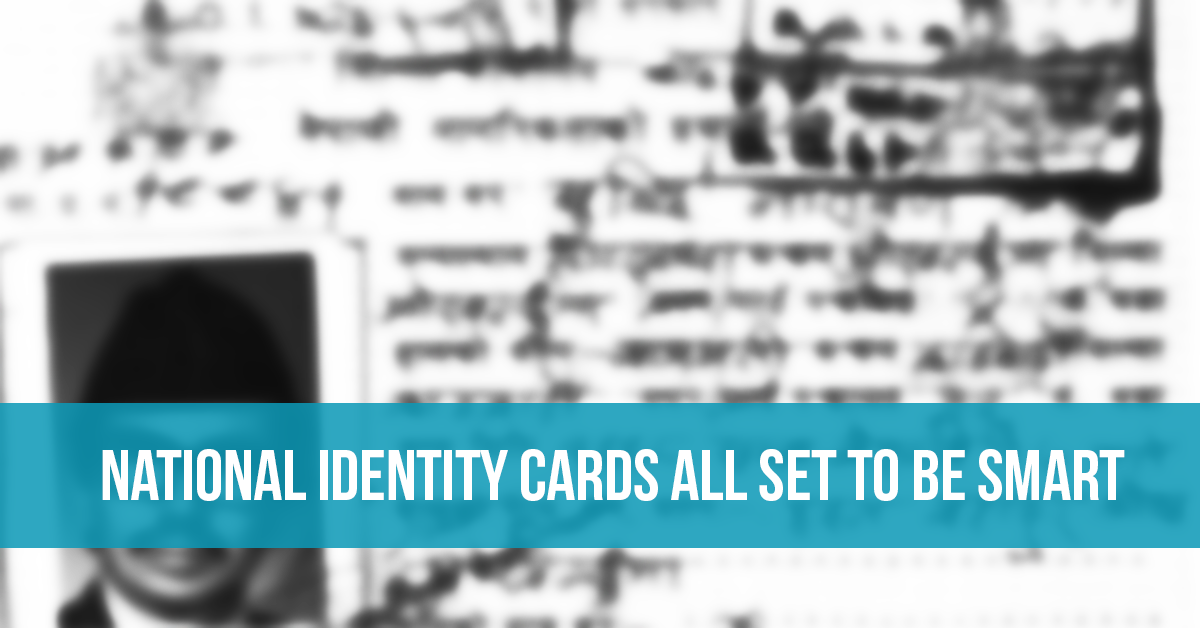
According to the announcement made by the Ministry of Home Affairs, bio-metric smart cards are all set to used in replacement for citizenship cards. Within January 2018, 1 lakh and 17 thousand Nepali will be provided with these biometric smart cards. This smart card will include the citizen’s personal information that exists in the present citizenship cards along with other biological information, collected and stored electronically.
As per the government’s annual policy, program and the budget, the National ID Center has set up a biometric card processing department that will be preparing all the necessary hardware and software supplies. At a meeting conducted among Government Officials in June 8, the design for the new bio-metric smart card had been approved.
Moreover, sensing the need for raising awareness about the significance of the biometric smart cards, the NID had been conducting consultations with the Election Commission of Nepal since September. They even put forward the idea for using these smart cards for voters’ registration or voter identity documents. The biometric smart cards will not only be the replacement of the citizenship cards, but also for distributing government services and social security benefits. These cards can also be used as an electronic authorization, cross-border security documentation and for the delivery of healthcare, welfare services, among others. All in all, these smart cards will help to provide prompt and quality service to the citizens at minimum cost, to maintain good governance and even to control crime in the society.
The Executive Director of National Identity Card Management Centre, Uddhav Prasad Timilsina has said that an online registration system will be made for registering the card. The Department of Passports is also said to be collaborating with NID Centre to add all the required information to the card. The polycarbonate cards, containing unique and random ID numbers, will contain 25 security features and will have unlimited validity. There’d be no initial charge for obtaining the card, but in case of loss or damage, the government is expected to charge around USD 3 which is the approximate manufacturing cost of one such card.
A French company: Safran Identity and Security, Morpho had won the bid for the project which is to be funded by the Asian Development Bank.







![Best Gaming Laptops in Nepal Under Rs. 250,000 (रु 2.5 Lakhs) [2025] Best Gaming Laptops Under 2.5 lakhs in Nepal [Feb 2025 Update]](https://cdn.gadgetbytenepal.com/wp-content/uploads/2025/02/Best-Gaming-Laptops-Under-2.5-lakhs-in-Nepal-Feb-2025-Update.jpg)
![Best Gaming Laptops in Nepal Under Rs. 120,000 (रु 1.2 Lakhs) [2025] Best Budget Gaming Laptops Under Rs 120000 in Nepal 2025 Update](https://cdn.gadgetbytenepal.com/wp-content/uploads/2025/05/Best-Budget-Gaming-Laptops-Under-Rs-120000-in-Nepal-2024-Update.jpg)
![Best Laptops Under Rs. 80,000 in Nepal [2025] Best Laptops Under 80,000 in Nepal March 2025 Update](https://cdn.gadgetbytenepal.com/wp-content/uploads/2025/03/Best-Laptops-Under-80000-in-Nepal-March-2025-Update.jpg)
![Best Gaming Laptops in Nepal Under Rs. 200,000 (रु 2 Lakhs) [2025] Best gaming lapotp under 2 lakhs Nepal Feb 2025](https://cdn.gadgetbytenepal.com/wp-content/uploads/2025/01/Best-Gaming-Laptops-Under-2-Lakh-Nepal-Feb-2025-Update.jpg)

![Best Mobile Phones Under Rs. 15,000 in Nepal [Updated 2025] Best Phones Under 15000 in Nepal 2024 Budget Smartphones Cheap Affordable](https://cdn.gadgetbytenepal.com/wp-content/uploads/2024/03/Best-Phones-Under-15000-in-Nepal-2024.jpg)
![Best Mobile Phones Under Rs. 20,000 in Nepal [Updated] Best Mobile Phones Under NPR 20000 in Nepal 2023 Updated Samsung Xiaomi Redmi POCO Realme Narzo Benco](https://cdn.gadgetbytenepal.com/wp-content/uploads/2024/01/Best-Phones-Under-20000-in-Nepal-2024.jpg)
![Best Mobile Phones Under Rs. 30,000 in Nepal [Updated 2025] Best Phones Under 30000 in Nepal](https://cdn.gadgetbytenepal.com/wp-content/uploads/2025/01/Best-Phones-Under-30000-in-Nepal.jpg)
![Best Mobile Phones Under Rs. 40,000 in Nepal [Updated 2025] Best Phones Under 40000 in Nepal 2024 Smartphones Mobile Midrange](https://cdn.gadgetbytenepal.com/wp-content/uploads/2024/02/Best-Phones-Under-40000-in-Nepal-2024.jpg)
![Best Mobile Phones Under Rs. 50,000 in Nepal [Updated 2025] Best Phones Under 50000 in Nepal](https://cdn.gadgetbytenepal.com/wp-content/uploads/2025/01/Best-Phones-Under-50000-in-Nepal.jpg)
![Best Flagship Smartphones To Buy In Nepal [Updated] Best flagship phone 2025](https://cdn.gadgetbytenepal.com/wp-content/uploads/2024/07/Best-Flagship-Phones-who-is-it-ft-1.jpg)